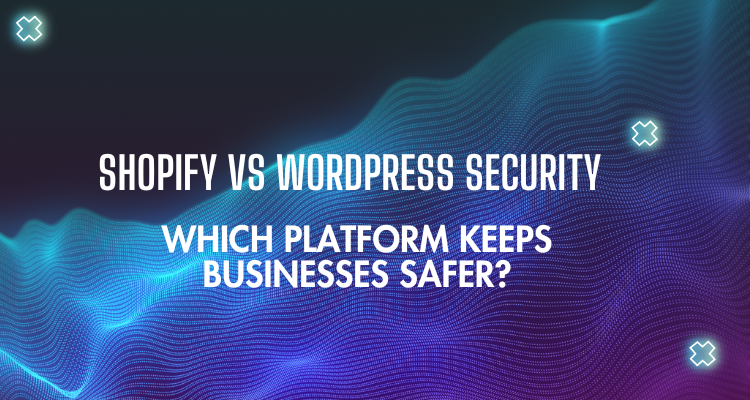Cybersecurity threats are increasing, making website security a top priority for businesses. Whether you run an eCommerce store or a content-based website, choosing a secure platform is crucial.
Both Shopify and WordPress offer great features, but which one provides better security? In this guide, we’ll compare Shopify vs WordPress security to help you make an informed decision—without risking your data, revenue, or customer trust.
Do you need expert guidance? WebCraftio offers a free consultation to help you choose the most secure platform for your business.
Read More: Best POS Systems: Square vs Shopify - Free Consultation
Why Is Website Security Critical for Businesses?
- Data Protection Laws:This follows GDPR (General Data Protection Regulation), which means businesses must secure customer data or risk heavy fines.
- Rising Cyber Threats: In 2023, over 39% of businesses reported cybersecurity breaches, costing thousands in damages.
- Customer Trust & Sales: Secure websites increase customer confidence and boost conversions.
This makes choosing the right website platform essential—one with built-in security features to prevent hacks, malware, and data breaches.
Shopify vs WordPress: Security Overview
Here’s a quick security comparison:
| Security Factor | Shopify | WordPress |
|---|---|---|
| Hosting & Security | Fully managed & secure | Self-hosted, security depends on hosting provider |
| SSL Certificate | Free & auto-installed | Manual setup required |
| Malware Protection | Built-in security features | Requires third-party plugins |
| DDoS Protection | Included in Shopify’s security | Requires security plugins |
| User Access Control | Pre-configured for security | Must be manually configured |
| PCI-DSS Compliance | Fully compliant | Requires third-party solutions |
| Software Updates | Automatic updates & patches | Manual updates required |
1. Hosting & Security
- Shopify handles all security updates automatically.
- Your website is protected from server attacks.
- No need for additional security plugins or monitoring services.
- Security depends on your hosting provider.
- You must configure firewalls and security plugins manually.
- More risk of hacks if hosting is weak.
Shopify: Fully Hosted & Secure
Shopify provides a fully managed hosting service, meaning:
WordPress: Self-Hosted, Security Depends on You
WordPress requires external hosting (e.g., Bluehost, SiteGround, WP Engine). This means:
Winner: Shopify (for hassle-free security).
2. SSL Certificate & Encryption
- Shopify: Shopify automatically provides a free SSL certificate to every store.
- WordPress: SSL setup is manual (depends on the hosting provider).
- Winner: Shopify (built-in SSL with no extra steps).
SSL (Secure Sockets Layer) encrypts data to protect customers from hackers.
3. Malware Protection & Hacking Risks
- Automatic malware scanning.
- Firewall protection against unauthorized access.
- 24/7 monitoring to detect threats.
- Websites are often targeted for malware infections.
- Security plugins like Wordfence or Sucuri are necessary for protection.
- Site owners must manually monitor for threats.
Shopify: Built-in Protection
Shopify is a closed system—hackers cannot modify its core code. It includes:
WordPress: Requires Extra Security Plugins
WordPress is open-source, meaning hackers can find vulnerabilities if you don’t secure it properly.
Winner: Shopify (automatic security monitoring).
4. DDoS Protection & Firewalls
- Shopify: Has built-in DDoS protection to prevent attacks.
- WordPress: Requires third-party services (e.g., Cloudflare) to defend against DDoS attacks.
A DDoS attack floods a website with traffic to crash it.
Winner: Shopify (prevents attacks automatically)
5. User Access & Security Controls
-
Shopify:
- Limits admin access to prevent unauthorized changes.
- Uses two-factor authentication (2FA) for better login security. WordPress:
- Requires plugins like "Limit Login Attempts" for security.
- User access settings must be manually configured.
Winner: Shopify (pre-configured security settings).
6. Payment Security & PCI Compliance
- Shopify:Fully PCI-DSS compliant—zero effort required from the store owner.
- WordPress:Requires additional third-party payment gateways to ensure compliance
What is PCI Compliance?
PCI-DSS (Payment Card Industry Data Security Standard) ensures secure credit card transactions.
Winner:Shopify (for built-in compliance).
7. Software Updates & Maintenance
- WordPress Core
- Themes
- Plugins
- Failing to update can result in security vulnerabilities.
Shopify:Automatically updates security patches without downtime.
WordPress:You must manually update:
Winner: Shopify (hands-free updates).
Common Security Risks & How to Avoid Them
Risk #1: Weak Passwords
Use strong passwords & enable 2FA authentication
Risk #2: Unverified Plugins (WordPress Only)
Install only trusted plugins from WordPress.org
Risk #3: Phishing Attacks
Never click suspicious emails pretending to be from Shopify or WordPress
Final Verdict: Shopify vs WordPress Security
Which Platform is More Secure?
Choose Shopify if you want:
- Automatic security updates
- Built-in malware protection.
- PCI-DSS compliance without extra effort.
Choose WordPress if you are:
- Comfortable with managing security manually
- Using reliable hosting & security plugins.
Bottom Line: Shopify is the more secure option for businesses that prioritize ease of use & built-in protection.
Get Expert Help with Your Website Security (Free Consultation)
Are you worried about website security? Whether you choose Shopify or WordPress, WebCraftio can secure your website with:
- Expert security audits
- Hassle-free Shopify migrations
- WordPress security optimization

